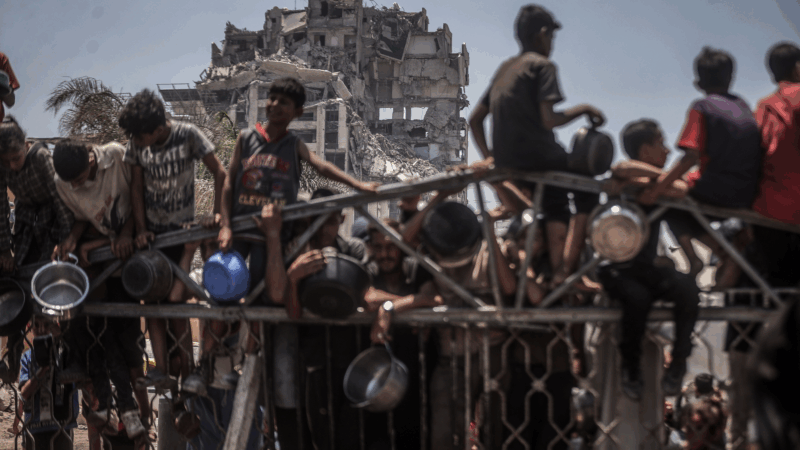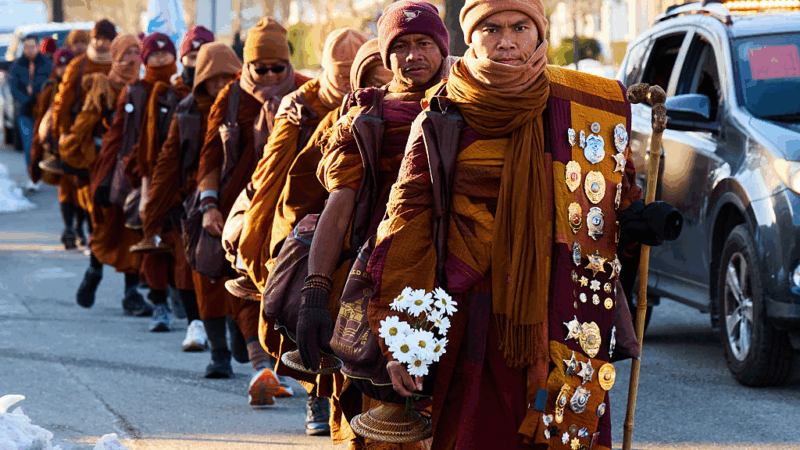Roles reversed: A veteran Gaza aid worker pleads for survival
Amjad Al Shawa has spent his career coordinating humanitarian aid in Gaza. As director of the Palestinian NGO Network, he’s long worked to get food, water, and medicine to those in need and is considered the bridge to other civil society organizations. But now, confined to northern Gaza, he says he can no longer provide even the basics for his own family.
“We are managing ourselves, with one meal, which could be some rice,” Al Shawa told NPR’s Michel Martin on July 28. “Yesterday I managed to have a salad which cost me about $60 for two dishes of salad for the family, me and my wife and three children.”
The food system in Gaza, choked by Israeli restrictions on aid, has collapsed. Milk, vegetables, and fresh fruit have vanished. Bread is rare. A kilo of flour now costs around $20. Sugar: $120. Even aid workers, Al Shawa says, are going hungry.
In response to claims of deliberate starvation, Israeli military spokesperson Brig. Gen. Effie Defrin told reporters on Sunday:
“We are not starving anyone. It’s not an aim. It’s not a war aim for us. We are fighting Hamas. Hamas is using his population as human shield cynically in order to create this campaign of starvation against Israel, against the IDF.” Separately, the IDF said it continues humanitarian operations in Gaza and called accusations of deliberate starvation “false.”
Al Shawa’s account comes as international monitors warn that famine could soon be declared in parts of Gaza. Over 470,000 people, about one in five residents, are now living in “catastrophic” hunger conditions, according to the UN-backed IPC classification. It also comes as two prominent Israeli human rights organizations have accused their own government of committing genocide in Gaza, in a new report titled “Our Genocide” — an allegation the Israeli government has strongly denied for more than two years.
The infrastructure around Al Shawa, like much of Gaza, is in ruins.
“I was displaced for one or 15 months. And when I came back, I found so many damages in my home as in other neighborhoods. There is so much rubble around me and also tents are in every corner and every road and every street, in all the spaces.”
He fears the worst isn’t over and that thousands could die of starvation in the next few days.
“We need everything. Everything. And I cannot separate the food from water, from hygiene, from medicine.”
NPR’s Michel Martin spoke with Al Shawa about what he sees each day — and his fears for what comes next.
The interview is edited for length and clarity.
Interview highlights
Michel Martin: If you’re looking around just where you are right now, sort of physically, how many of the structures, for example, are stable, where you’re living?
Al Shawa: I was displaced for one or 15 months. And when I came back, I found so many damages in my home, as in other neighborhoods. There is so much rubble around me, and also tents are in every corner, and every road, and every street, in all the spaces.
Martin: What kind of access do people have to food and water where you are?
Al Shawa: The one meal that we used to have for the past four months disappeared because there is a severe shortage of the food supplies. We are depending on some bread, if we manage to get [it’, or some rice with nothing. There is no fresh food. There [are] no vegetables, fruit, meat, milk. We have about 55,000 babies. Their mothers can’t breastfeed them. Also, there is no milk. Sometimes the mothers are boiling the rice and feeding the children.
Martin: How are you and your family doing?
Al Shawa: Yesterday I managed to have a salad, which cost me about $60 — two dishes of salad for the whole family, me and my wife and three children. It’s not an easy mission to live. You know, one kilo of flour [is] about $20 now.
Martin: Twenty dollars for a kilo of flour?
Al Shawa: Yes.
Martin: And do you have anything to cook it with?
Al Shawa: No. I’m talking about flour, that we just make bread. And we have no cooking gas and no bakeries, so we have to make it with these traditional ovens. Also, if you want to buy one kilo of sugar — you know, sugar for energy — I could see young men who lost [consciousness] or they just fall down because they have no power. It’s four months now. I’m saying it’s engineered starvation.
Martin: Where do people get water?
Al Shawa: We are dependent on the humanitarian agencies to get water to the homes, and it’s a very limited amount that they have… every day it’s 3 to 5 liters a day for daily use… we used to have, before the war, 80 liters a day.
Martin: Can I ask you — what will you eat today?
Al Shawa: I don’t know, and I’m not asking, you know? And when I go there, whatever this whatever what we have, I’m saying we are in good condition. My mission here, and others, how to keep people alive, to save the lives as maximum.
Martin: How many people do you believe, based on your information, are at risk of dying from starvation?
Al Shawa: I have concerns about 1000s in the next few days if… What has entered is only flour. If I’m talking about the nutrition chain, it’s not only flour. We need everything. Everything. And I cannot separate the food from water, from hygiene, from medicine. All this package is supposed to be. I called urgently, who has this kind of professional physicians on the issue of nutrition, to come to struggle, to come to Gaza to save these lives, with equipment, with materials, with supplies, to save the lives of these children.
The audio version of this interview was produced by Ben Abrams.
Transcript:
A MARTÍNEZ, HOST:
Israel has begun what it calls humanitarian pauses in fighting for 10 hours each day to allow more aid to get into Gaza’s biggest population centers. This happened over the weekend. U.N.-backed security experts have said 1 in 5 people face starvation in Gaza. Israel’s military repeatedly rejects what it calls, quote, “false claims of deliberate starvation.”
Amjad Al Shawa is a veteran humanitarian worker currently confined in northern Gaza. He directs the Palestinian NGO Network, or PNGO, which helps coordinate food, counseling and medical services, and he spoke with our co-host Michel Martin.
MICHEL MARTIN, BYLINE: Amjad Al Shawa, thank you so much for speaking with us.
AMJAD AL SHAWA: Thank you.
MARTIN: If you’re looking around just where you are right now sort of physically, how many of the structures, for example, are stable, like, where you’re living?
AL SHAWA: I was displaced for 15 months, and when I came back, I find so many damages in my home as other neighborhoods. And there is so many rubbles around me. And also, tents were in every corner, in every road, in every street, in all the spaces.
MARTIN: And what about food and water? What kind of access do people have to food and water where you are?
AL SHAWA: It’s very, very, very limited access to food. The one meal that we used to have along the four – last four months now is disappeared because there is severe shortage of the food supplies and medical supplies. So we are depending on some bread if we manage to get, or some rice with nothing. There is no fresh food. There is no vegetables, fruit, meat, milk. We have about 55,000 babies. Their mothers can’t breastfeed them. Also, there is no milk. Sometimes that – you know, the mothers are boiling the rice and feeding the children. It’s so…
MARTIN: What about you, though? Forgive me for interrupting, but I would like to know about you. Like, how are you doing? How is your family doing?
AL SHAWA: You know, we are managing ourselves sometimes with one meal, which could be some rice. Yesterday, I managed to have salad, which cost me about $60 – two dish of salads for all the family, me and my wife and the three children that are with me now. It’s not easy mission to live. You know, one kilo of flour, if you wanted to buy, it’s about $20 now, plus (ph)…
MARTIN: Twenty dollars for a kilo of flour?
AL SHAWA: Yes.
MARTIN: And do you have anything to cook it with?
AL SHAWA: No. It’s only I’m talking about flour, that we just make bread. And we have no cooking gas and no bakeries, so we have to make it with these traditional ovens. Also, if you want to buy one kilo of sugar, you know, sugar for energy – that I could see young men who lost conscious, or they just fall down because they have no power. It’s four months now. It’s – I’m saying it’s engineered starvation.
MARTIN: What about water? Where do people get water?
AL SHAWA: We are dependent on the humanitarian agency to get water to the homes, and it’s very limited amounts that they have. Every day, it’s three to five liters a day for daily use and for a drink. We used to have before the war 80 liters a day.
MARTIN: So just staying clean must be difficult. Just washing must be difficult because you need that water…
AL SHAWA: Yeah.
MARTIN: …To drink and to…
AL SHAWA: To have a shower. You know, this is people who are staying in the tents. And talk about the majority of the Palestinians now in tents, and there is missing hygiene items. Now there is soap and other things that is needed, so it’s missing. So yeah, thank you to address this water issue.
MARTIN: Can I ask you, like, what will you eat today?
AL SHAWA: I don’t know, and I’m not asking, you know? And when I go there, whatever this – whatever what we have, I’m saying we are in good condition. Some people who has not. ‘Cause my mission here and others – how to keep people alive, to save the lives as maximum.
MARTIN: How many people do you believe based on your information are at risk of dying from starvation?
AL SHAWA: Yeah, I have be frank. I have concerns about thousands in the next few days if…
MARTIN: In the next few days.
AL SHAWA: To be frank also with you, what is enter, it’s only flour. And the flour, I’m talking about nutrition chain. It’s not only flour. We need everything – everything – and I cannot separate the food from water from hygiene from medicine. All this package supposed to be. And I called urgently who has this kind of professional physicians on the issue of nutrition to come – to struggle to come to Gaza to save these lives with equipments, with materials, with supplies to save the lives of these children.
MARTIN: That is Amjad Al Shawa. He’s the director of PNGO. That’s the Palestinian NGO Network. And he is speaking to us from northern Gaza. Mr. Al Shawa, thank you so much for speaking with us and for sharing with us this information about what you see and what you’re doing and what you know. Thank you so much.
AL SHAWA: All the best now.
MARTÍNEZ: Yesterday, an Israeli military spokesperson told journalists that Israel is not starving anyone and, quote, “Hamas is using this population as a human shield cynically in order to create this campaign of starvation against Israel.”
Buddhist monks head to DC to finish a ‘Walk for Peace’ that captivated millions
The group of Buddhist monks is set to reach Washington, D.C., on foot Tuesday. The monks in their saffron robes have become fixtures on social media, along with their rescue dog Aloka.
Trump is threatening to block a new bridge between Detroit and Canada from opening
President Donald Trump on Monday threatened to block the opening of a new Canadian-built bridge across the Detroit River, in his latest salvo over cross-border trade issues.
Ghislaine Maxwell appeals for clemency from Trump as she declines to answer questions
Maxwell declined to answer questions from House lawmakers on Monday, but indicated that if President Trump ended her sentence, she was willing to testify that neither he nor former President Clinton had done anything wrong in their connections with Epstein.
Lindsey Vonn says she suffered ‘complex tibia fracture’ in her Olympic downhill crash
The 41-year-old star said her torn ACL was not a factor in her crash. "While yesterday did not end the way I had hoped, and despite the intense physical pain it caused, I have no regrets," she wrote.
Guerilla Toss embrace the ‘weird’ on new album
On You're Weird Now, the band leans into difference with help from producer Stephen Malkmus.
Nancy Guthrie search enters its second week as a purported deadline looms
"This is very valuable to us, and we will pay," Savannah Guthrie said in a new video message, seeking to communicate with people who say they're holding her mother.





